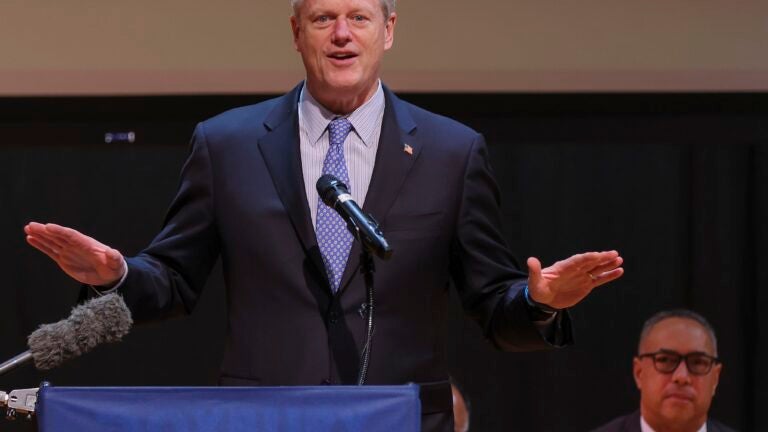At Globe Summit, NCAA president Charlie Baker discusses his role and the state of collegiate athletics
College Sports
Baker made clear the NCAA’s understanding of its place in the social media age, when young people can build a brand and an influence online.

The pipeline from high-level Massachusetts politics to high-level sports leadership has become a strong one in recent years.
Charlie Baker and Marty Walsh were close colleagues for several years in their respective tenures as governor of Massachusetts and mayor of Boston, and now they improbably find themselves both in sports positions, Baker as president of the NCAA and Walsh as executive director of the NHL Players Association.
That pathway was a subject of discussion at Wednesday’s feature event at the Globe Summit, where Baker discussed his role at a pivotal time in collegiate athletics, with conference realignment, the transfer portal, and NIL rules radically shifting the landscape.
Walsh’s path to the sports industry was a bit more straightforward than Baker’s, having been tapped by President Joe Biden for a cabinet position as Secretary of Labor, a job he swapped for a role largely defined by labor negotiations with the NHLPA.
Baker’s jump to the NCAA, driven by Red Sox CEO Sam Kennedy, was a bit more surprising. But between executive leadership at a macro level, and balancing dozens of conferences, hundreds of committees, and more than a thousand member schools, Baker’s new gig does bear some similarities to his old one.
“My willingness to work in that kind of environment looks a lot like the one I came out of, where you have legislators and local officials and advocates and lots of stuff coming at you from a million directions all the time,” Baker said.
“Being in an environment like that is familiar. I think, more than anything, it should be that I’ll find ways to create what I’d describe as common ground, and get us to the place where we make decisions before things happen as opposed to reacting and responding when something happens.”
Baker made clear the organization’s understanding of its place in the social media age, when young people can build a brand and an influence online. He takes no issue with that; the concern is how Name-Image-Likeness rules have been implemented.
“The concern I have about the way it works now is that there’s no framework and no transparency and no accountability,” Baker said. “I mean, it’s virtually impossible for a student-athlete or their family to know if what someone is telling them is true or not — an agent, a rep — and that bothers me.
“It’s hard to tell what the market value looks like, it’s really hard to tell. If someone says, ‘I’ve done this for five or six other kids,’ nobody knows. And I’ve talked to student-athletes that have said to me their concern about this thing is that they just don’t know who to believe.”
Baker was asked about the contrast between his personal popularity as governor — he consistently polled as one of the most popular governors in the country throughout his term — and the wide-ranging unpopularity of the organization he now presides over.
For Baker, progress on that front began with a state-of-the-business review and meetings with all 97 conferences to hear grievances and kick-start conversations about the future of collegiate athletics.
“I’m going to meet with all of them, every year, and do the best we can to be student-athlete-focused, and also somewhat forward-looking,” Baker said. “If we do that, and we do it well, and we implement the holistic student-athlete model and the insurance injury protection program and some of these other things, we can work on the brand.
“But I’ve always felt, if you have issues with your brand, you can’t blame that on your comms people. That’s not your comms people. They can only work with what they have. And it’s up to us to figure out a way to convince people this is a different NCAA.”
While Baker’s new role involves plenty of the politicking and bureaucracy he dealt with on Beacon Hill, it does have its perks. He highlighted last month’s event at Nebraska, where the women’s volleyball team played in front of 92,000 fans, a moment that gave him goosebumps.
“That was mind-boggling, it really was,” Baker said. “Look, I played sports, my wife played sports, my kids play sports; I love watching kids play sports, I just love it.
“I’ve met probably a thousand student-athletes, and for all the noise that shows up on social media, those face-to-face moments I get to spend with student-athletes when I visit campuses for one thing or another, that’s where I get what I would call the positive vibe about the future.”
Get the latest Boston sports news
Receive updates on your favorite Boston teams, straight from our newsroom to your inbox.